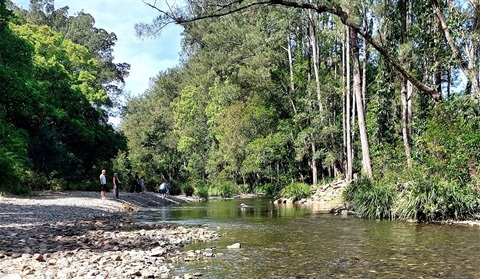Promised Land Water Quality and Testing
Published on 16 January 2023

Through lab accredited testing, Bellingen Shire Council was informed that the test results from water samples taken on 3 January and 6 January were of poor quality, with a high reading of enterococcus bacteria. This was reported to Beachwatch NSW and the public was informed through the Council’s communication channels and local media. It was advised not to swim at Never Never River at the Arthur Keogh Reserve and signs were placed at the problematic location.
Subsequent sampling at four different Never Never River locations on 9 and 10 January, including Arthur Keogh Reserve, indicate FAIR water quality. This suggests the poor results were an isolated incident, rather than an ongoing issue such as a septic system breach. Mayor Allan said:
“Recreational water can sometimes be unsuitable for swimming, especially after rainfall when stormwater, wastewater and agricultural runoff can overflow. An increased visitation of people, pets and traffic to Never Never Creek over the festive season, is likely the cause of these poor-quality sampling. The result of further samples conducted this week, suggests that it was an isolated issue. The water quality has recovered, however it is a good reminder of the fragility of the area, which we all need to be mindful of when enjoying the beauty of the area.”\
In September 2022, Bellingen Council partnered with the NSW Government Beachwatch program that monitors and reports on water quality of the NSW’s coast recreational swimming area. This gives swimmers access to weekly updates on reliable water quality information at 7 popular locations across the Shire.
The current program sites are:
- Never Never River – Arthur Keough Reserve
- Bellinger River – Lavenders Bridge
- Bellinger River – Mylestom tidal pool
- North Beach – At Surf Club
- Urunga Lagoon – Urunga Lido
- Hungry Head Beach – near Surf Club
- Dalhousie Creek – near Surf Club
The Bellingen Council ensures that water samples are taken on site and delivered immediately to a laboratory where they are incubated and assessed to measure enterococcus bacteria levels. Site conditions, water temperature and dissolved oxygen content are also recorded. The results are provided to the NSW Government Beachwatch program for reporting and monitoring. For more information on the water quality of the Shire’s Beachwatch locations listed, residents can visit the NSW government website, for weekly updates to the star rating.
Water Star Rating
What is Enterococcus?
- Enterococcus is a bacteria that naturally occurs in the intestines of warm-blooded animals - mammals and birds.Enterococcus is a fecal-indicator bacteria, frequently used to measure recreational water safety.
- When enterococcus is present in the water it suggests that fecal contamination may have occurred and other pathogens, viruses, or bacteria may be present in the water that can cause sickness.
- Swimming in contaminated water can lead to illness, with symptoms including gastrointestinal illness, ear infections, and skin rashes.
- Children and people suffering from autoimmune disorders run a higher of getting sick after swimming in polluted waters.
How does enterococcus end up in the water?
- The impact of people and pets. Pet owners who do not pick up after their pets threaten the water quality.
- Wildlife. Wildlife also inputs fecal bacteria into waterbodies. Animals defecate and when they are located in or nearby to a waterbody, this can affect water quality.
- Agriculture. Agriculture can cause localised threats to water quality where proper runoff protocols do not exist, especially where cattle have direct access to waterways.
- Stormwater & Urban Runoff.
- Sewage via Mismanaged or Untreated Wastewater. sewage can end up in recreational waterbodies as a result of combined sewage overflows, leaks, misconnects, and aging infrastructure. Rural areas largely rely on septic systems. Septic systems require maintenance in order to properly treat wastewater.
Further information can be obtained from Sustainable Environment and Waste Manager, on 6655 7300 or by emailing council@bellingen.nsw.gov.au